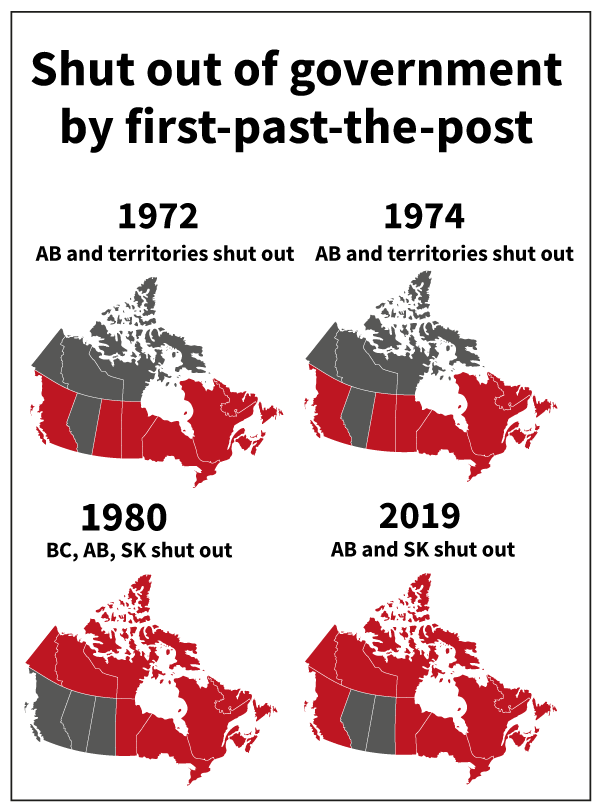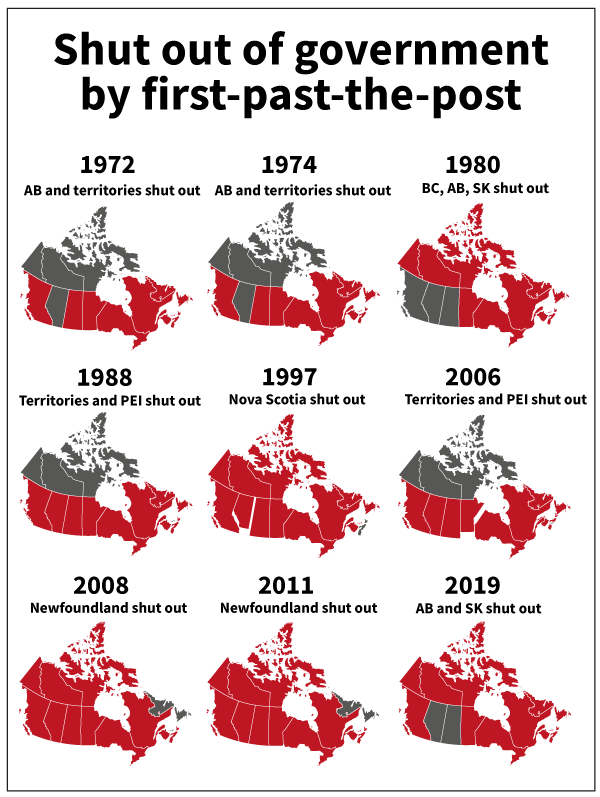Fair Vote Canada calls for real solutions to the West being left out – not band-aid appointments
Justin Trudeau’s decision to appoint former Liberal Cabinet Minister Anne McLellan as a “government advisor” is an inadequate, band-aid solution to the serious divisions created by our non-proportional electoral system.
However, Fair Vote Canada applauds the choice of Anne McLellan herself, since she was known among Liberal electoral reformers in 2006 as a quiet supporter of proportional representation. She will understand perfectly why an appointment is a poor substitute for representatives elected by voters.
More than 30% of Albertans voted for parties other than Conservatives, yet our first-past-the-post electoral system gave them only one representative in Alberta – NDP MP Heather McPherson in Edmonton-Strathcona. A proportional representation system would have let Alberta Liberal voters elect five MPs, and Saskatchewan two.
“History repeats itself: in 1980 Pierre Trudeau had no MPs from Alberta and Saskatchewan” says Fair Vote Canada President Réal Lavergne “We appeal to Anne McLellan to recommend a lasting solution to this false exaggeration of Canada’s regional division.”
In response to this problem in 1980, Pierre Trudeau’s Throne Speech promised “You will be asked to appoint a committee of Parliament to examine the electoral system in order to ensure that the highest degree of representativeness and responsibility is achieved and that the confidence of Canadians in parliamentary institutions is strengthened.” Again in 2006, 2008 and 2011 Liberal voters in Alberta elected no MP. Yet the same problem persists.
The serious regional distortions created by first-past-the-post drove former Liberal leader Stephane Dion to advocate for a moderate system of proportional representation in 2013:
“Our current voting system weakens Canada’s cohesion. It artificially amplifies regional support for parties and makes the country look more antagonistic than it is. When you watch the election results on TV, you ask yourself, ‘Which part of my country will be out of the executive branch? Will it be the prairies? Quebec?”
Following this year’s divisive federal election, resulting in a government with the lowest percentage of support in Canadian history, it’s clear that Canada needs electoral reform. An Angus Reid poll in September showed that 77% of respondents supported proportional representation and 79% agreed the government should convene a National Citizens’ Assembly on Electoral Reform.
“Voters across the country deserve to be treated as equals at the ballot box,” says Fair Vote Canada’s President Real Lavergne. “Whether your vote counts should not depend on where you live.” In 2015, Justin Trudeau told Canadians, “We need to know that when we cast a vote, it counts. That when we vote, it matters.” That goal is more urgent today than ever.
This problem of the West being shut out by first-past-the-post was first recognized by Pierre Trudeau in 1979 following the Pepin-Robarts Commission, which recommended proportional representation. Pierre Trudeau stated that the federal government would not be able to speak for the nation until Canada adopted proportional representation.
Since Trudeau has ruled out a coalition government with any party, neither Alberta’s Conservative MPs nor the NDP’s McPherson will be able to function as an elected Western MP in cabinet. This, despite McPherson indicating her willingness to serve in a multi-party cabinet.
McPherson’s hard-fought win was helped by the Green Party candidate dropping out days before the election to help ensure that non-Conservative voices in Alberta would have an ounce of representation in Parliament.
A minority Parliament presents a new opportunity for parties to work together to achieve electoral reform for Canadians. Jagmeet Singh stated the morning after the election that “The results show not a broken Canada, but a broken electoral system, and it’s certainly clear we need to fix it.“ Former Green leader Elizabeth May spoke of the urgent need for electoral reform in her October 24 letter to Justin Trudeau.
Promising to “listen” isn’t enough. Canadians want fair representation — and the government can work with other parties to make it happen.
After 100 years of politicians contemplating the problem of Canadian unity versus their own self interest, we need a path forward to consensus and action.
In order to take the decision on electoral reform out of the hands of politicians, Fair Vote Canada is calling for a National Citizens’ Assembly on Electoral Reform. Participants in a Citizens’ Assembly would be selected by stratified random sample, using a civic lottery to create a body that is demographically representative of the population as a whole, from each region of every province. The result: citizens working together on behalf of their fellow citizens. The recommendations of a Citizens’ Assembly could legitimately be implemented by Parliament in time for the next scheduled election.
###
Fair Vote Canada is a cross-partisan national citizens’ campaign representing 80,000 Canadians advocating for voting system reform. FVC promotes the introduction of an element of proportional representation into elections at all levels of government.


